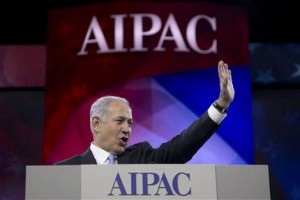 SAN DIEGO�Judy and I just returned from AIPAC�s National Policy Conference in Washington, D.C. This was my third Policy Conference and Judy�s first. The number of attendees grows each year. This time 14,000 supporters of Israel were present, including 2,300 students. The participants are surprisingly diverse. In addition to Jews, Christians, Blacks, Latinos, and Democratic and Republican national and state leaders also attend. This year Tifereth Israel was represented by Karen Zeiger and David Ogul, as well and Judy and me.
SAN DIEGO�Judy and I just returned from AIPAC�s National Policy Conference in Washington, D.C. This was my third Policy Conference and Judy�s first. The number of attendees grows each year. This time 14,000 supporters of Israel were present, including 2,300 students. The participants are surprisingly diverse. In addition to Jews, Christians, Blacks, Latinos, and Democratic and Republican national and state leaders also attend. This year Tifereth Israel was represented by Karen Zeiger and David Ogul, as well and Judy and me.We heard a diverse array of speakers, including Secretary of State John Kerry, Israeli Prime Minister Benjamin Netanyahu, Secretary of the Treasury Jacob J. Lew, Senator John McCain, and Pastor Chris Harris from Chicago�s Bright Star Church.
Pastor Harris and his choir also treated us to some rousing selections of gospel music during the conference.
Two messages were repeated over and over again during the general sessions: Iran will not be allowed to develop a nuclear weapon, and that Israel is ready to make peace with the Palestinians and agree to a two-state solution. However, the Palestinians must recognize Israel as the nation-state of the Jewish People, guarantee that Israel will be secure from further terror attacks, and give up their claim that Palestinian refugees be allowed to resettle in the homes they left in Israel, the �right of return.�
Secretary of State Kerry explicitly confirmed the United States� support of all of the above. Prime Minister Netanyahu praised Kerry�s efforts, spoke of Israelis being ready to make the tough sacrifices that peace will require, and for the first time in my recollection, told of the dividends that peace could bring to the region:
�Many Arab leaders � and believe me, this is a fact, not a hypothesis, it�s a fact � many Arab leaders today already realize that Israel is not their enemy, that peace with the Palestinians would turn our relations with them and with many Arab countries into open and thriving relationships.�
Bibi�s criticism of President Obama�s diplomatic negotiations with Iran over their nuclear program was muted, but he clearly favored a more aggressive approach. Secretary of State Kerry reiterated the United States� commitment to stopping Iran from building a nuclear weapon, promised harsher sanctions if the current negotiations fail, and said no possible response has been taken off the table.
All speakers at the conference condemned the BDS (Boycott, Divestment, and Sanctions) movement that has been gaining steam throughout the world. The continued claims that Israel is being unfairly singled out for its alleged civil rights violations of Palestinians (there is no such movement protesting human rights violations in Syria, Saudi Arabia, Russia, China, Russia, etc.), however, seems to fall on deaf ears. Everyone acknowledged that the BDS movement is a growing concern.
AIPAC�s raison d�etre is to nurture the United States � Israel connection. This does not mean, however, that only one point of view is heard about Israel and its policies during the conference. There is a surprising variety of opinions that are expressed in official meetings and in the hallways. However, all of us agree on Israel�s right to exist, to have secure borders, and to be free of terrorist threat. We also agree that the unique partnership between Israel and the United States is beneficial to both countries.
After I returned from the Policy Conference last year I made a concerted effort to encourage more of our congregants to attend. Although I was not successful, I am going to redouble my efforts this year. AIPAC�s Policy Conference is a unique opportunity not only to support Israel, but to learn a great deal about her successes and the challenges facing her in the coming years.
If you would like to watch some videos of the Conference, please�click here. If you would like to register for next year�s conference (March 1-3, 2015), please�click here. (Please note, if you sign up now you will receive a $200 discount.)
By San Diego Jewish World
The Iran Project is not responsible for the content of quoted articles.










